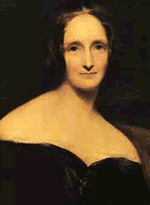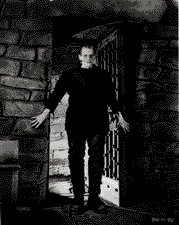
Mary Shelley |
Stories of the Human Spirit
Mary Shelley (1797-1851):
Frankenstein (1818)
|
|
Mary Shelley, wife of the poet Percy Bysshe Shelley, was only 19 when she wrote the gothic tale of Frankenstein: The Modern Prometheus (1818). The book was published anonymously and became an immediate bestseller. Only when the second edition appeared in 1823, was it revealed that the author was a woman. Knowledge alone was not enough for Victor Frankenstein. His arrogance led him to "bestow animation upon lifeless matter." Scavenging body parts from graveyards and experimenting with electrochemistry, his act of creation, although begun with the best of intentions, failed because of hubris. In recounting this chilling tragedy, Mary Shelley demonstrates both the corruption of an innocent creature by an immoral society and the dangers of playing God with science & technology.
Dr. Frankenstein describes his creature coming into life:
Frankenstein's monster speaks to his creator:
Dr. Frankenstein's lament & call the spirits for help:
"Man," I cried, "how ignorant art thou in thy pride of wisdom! Cease;
you know not what it is you say." I broke from the house angry and disturbed,
and retired to meditate on some other mode of action... I knelt on the grass
and kissed the earth, and with quivering lips exclaimed, "By the sacred earth
on which I kneel, by the shades that wander near me, by the deep and eternal
grief that I feel, I swear; and by thee, O Night, and the spirits that preside
over thee, to pursue the daemon who caused this misery until he or I shall perish
in mortal conflict. For this purpose I will preserve my life: to execute this dear
revenge will I again behold the sun and tread the green herbage of earth, which
otherwise should vanish from my eyes for ever. And I call on you, spirits of the
dead; and on you, wandering ministers of vengeance, to aid and conduct me in my work.
Let the cursed and hellish monster drink deep of agony; let him feel the despair
that now torments me." (pp. 194-196)
Frankenstein's monster speaks to explorer Robert Walton
Once my fancy was soothed with dreams of virtue, of fame, and of enjoyment. Once I
falsely hoped to meet with beings who, pardoning my outward form, would love me for
the excellent qualities which I was capable of unfolding. I was nourished with high
thoughts of honour and devotion. But now crime has degraded me beneath the meanest
animal. No guilt, no mischief, no malignity, no misery, can be found comparable to
mine. When I run over the frightful catalogue of my sins, I cannot believe that I am
the same creature whose thoughts were once filled with sublime and transcendent visions
of the beauty and the majesty of goodness. But it is even so; the fallen angel becomes
a malignant devil. (p. 213)
Frankenstein (or The Modern Prometheus), Maurice Hindle (Ed.), Penguin Books, London, 1985 |
|
Mary Shelley Bio
|
Literary Bio
|
Shelley's Frankenstein
|
E-text (virginia.edu) |
|
Gopher-text (upenn.edu)
|
Mary Shelley & Frankenstein
|
Frankenstein Exhibit |
|
Frankenstein Films
|
Literary Gothic
|
A Frankenstein Study
|
Shelley's Grave |
![]()
| Top of Page
| Human Spirit Stories
| Singularity Resources
| Wisdom Stories
| Peace |
| Stanford Lectures
| Art & Spirit
| Books
| Enlightenment
| Poetry
| A-Z Portals
| Home |
![]()
| © Peter Y. Chou, WisdomPortal.com P.O. Box 390707, Mountain View, CA 94039 email: peter@wisdomportal.com (9-14-2003) |
 |
.jpg)
